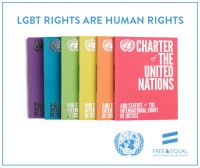Difference between revisions of "LGBTQ Individuals at the United Nations"
| Line 125: | Line 125: | ||
* [[Richard Grenell]] | * [[Richard Grenell]] | ||
* [[James Hormel]] | * [[James Hormel]] | ||
| + | * [[Curtis Ried]] | ||
* [[Eleanor Roosevelt]] | * [[Eleanor Roosevelt]] | ||
Revision as of 23:47, 19 September 2022
The United Nations (UN) is a global inter-governmental organization whose express purpose is to foster and promote international co-operation. As such, it is an important institution for the LGBTQ community and its push for both the recognition and adoption of human rights. Indeed, promoting human rights is in the charter of the organization, as is fostering social development.
UN treaties, signed by all member states, are a means to state and globally enforce any human rights pertaining to LGBTQ issues. The UN also sets the standards on human rights that are expected of its 193 member countries. Thus, the organization represents the principle means to get collective international support for the issues facing the community.
Free and Equal, a project of the UN Human Rights Office, is the organization's global education program for LGBTQ equality. The program's logo is shown above left. The objective of Free and Equal is to engage people in conversation to promote the fair treatment of the LGBTQ community around the world and to generate support for measures to protect its rights.
UN Globe is the LGBTQ staff organization that fights for the equality and non-discrimination of all UN staff and peacekeeping officers.
Several concrete measures have been taken by the UN to support this mission:
- The first UN report on human rights of LGBTQ people was prepared in 2011;
- Several resolutions in support of equal rights for the LGBTQ community passed in 2011 and 2014 by the Human Rights council;
- This was followed by several resolutions passed by the General Assembly on issues such as preventing the loss of life based on sexual orientation, fair judicial treatment of LGBTQ individuals, and so on;
- The first ever UN Security Council meeting focussed on LGBTQ rights and the persecution of LGBTQ individuals was held in August 2015;
- Appointed a UN Independent Expert to address violence and discrimination based on sexual orientation and gender identity (including LGBTQ) around the world in 2016, a move which was affirmed by the General Assembly. This position will assess the implementation of existing international human rights law, identify best practices and gaps, raise awareness of violence and discrimination based on sexual orientation and gender identity, and engage in dialogue and consultation with countries and other stakeholders. The position will also facilitate provision of advisory services, technical assistance, capacity-building, and cooperation to help address violence and discrimination on these grounds.
In this context, it is also imperative that members of the LGBTQ community are present and active within the organization. Having openly gay individuals in this legislative assembly ensures both a visible contribution to the inclusion of LGBTQ human rights in the discussion, and a greater assurance that these rights will be respected.
To this end, we have identified numerous LGBTQ individuals who are, or have been, active participants at the UN. These include member-country Ambassadors, activists, Goodwill Ambassadors, experts on HIV/AIDS issues, and more. They hail from New Zealand, Brazil, Vietnam, Finland, Great Britain, China, Syria, Canada, the United States, Romania, Thailand, Israel, Australia, the Philippines, Spain, Sweden, India, and Mexico. Read their fascinating biographies below:
Australia
Brazil
Canada
China
Colombia
Costa Rica
Finland
France
Great Britain
India
Israel
Mexico
New Zealand
Philippines
Puerto Rico
Romania
Spain
Sweden
Syria
Thailand
The Netherlands
United States
Vietnam
See Also
- LGBTQ Ambassadors
- Government Officials and Experts in Foreign Affairs Who Have Identified as LGBTQ
- LGBTQ Head of State
Further Reading/Research
- https://www.unfe.org/
- http://www.unglobe.org/
- http://www.ohchr.org/EN/Issues/Discrimination/Pages/LGBTUNResolutions.aspx
- http://www.un.org/apps/news/story.asp?NewsID=40743#.VlN_6DZdGM8
- https://blogs.state.gov/stories/2015/08/26/historic-step-united-nations-lgbt-rights
- http://arc-international.net/network-development/conference-presentations/presentation-un-mechanism/
- http://www.out.com/news-opinion/2015/12/10/united-nations-takes-stand-against-lgbt-discrimination

